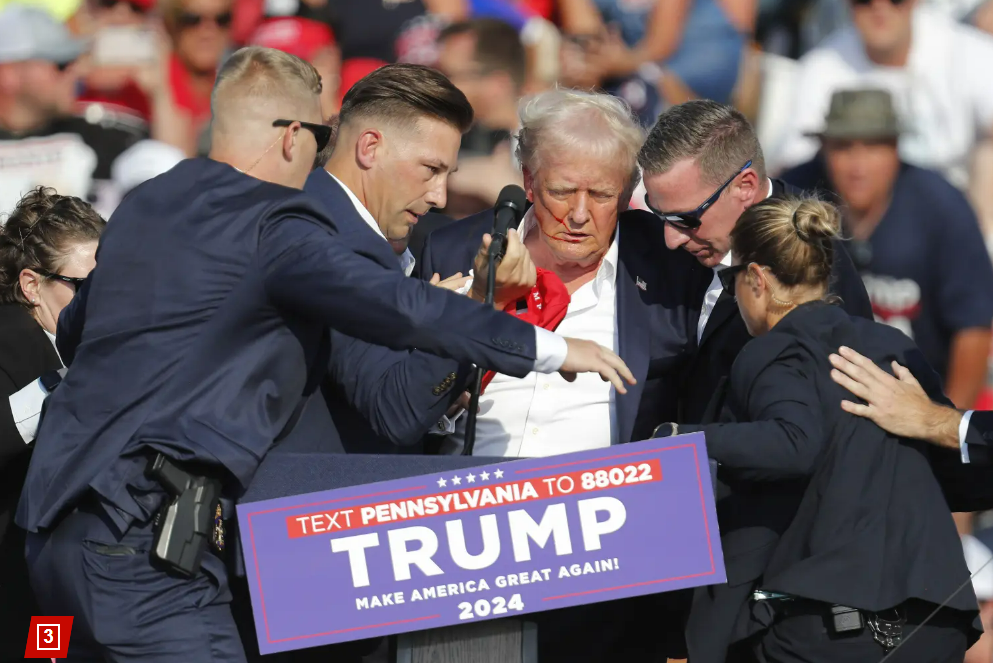The shooting of former president Donald Trump and three attendees at his rally was just one of nearly 300 mass shootings in the US so far this year.
Amid all the shocking news from that day, there was one depressingly familiar detail. The shooter used an AR-15 style rifle, the kind of semiautomatic weapon that has featured in dozens of mass shootings since the Sandy Hook Elementary School massacre of 2012.
Despite the devastation it has brought, the AR-15 has a fierce grip on American politics. The NRA has called the AR-15 “America’s Rifle”, and in 2023 five Congressional Republicans proposed a bill to declare it America’s “National Gun”.
The AR-15 enjoys a cult status on the American Right, a defiant response to persistent efforts to ban it.
Since a Clinton-era assault weapons ban expired in 2004, the United States has never come close to reinstating federal curbs on semiautomatic rifles. Will this change now that an AR-15 almost claimed the life of Donald Trump, the former Republican president and current presidential nominee? It’s unlikely. But past shootings of American presidents have given rise to some of the most significant gun control reforms in the country’s history.
Assassinations and gun control in the 1960s
The murder of President John F. Kennedy in November 1963 began a painful discussion about the need to curtail the flow of cheap firearms in the United States. Lee Harvey Oswald had used a surplus Italian military rifle, purchased from an ad in a magazine, to shoot the president.
Within days of Kennedy’s death, Connecticut Senator Thomas Dodd was proposing legislation to ban mail order sales of rifles. His initial proposals never made it out of Senate committees, and faced opposition from the NRA.
But President Lyndon Johnson continued to press Congress on the issue, which eventually resulted in the Gun Control Act of 1968. This introduced minimum ages for gun purchases, restricted interstate sales, and prohibited sales to felons, drug addicts and “mentally incompetent” persons.
Tragically, it took two more shooting assassinations to get the legislation passed. The murder of Martin Luther King Jr in April 1968, followed by Robert F. Kennedy as he campaigned for the presidency in June, provided the final push for congressional votes in favour of the legislation.
By this point, the Gun Control Act even had the partial support of NRA Executive Vice President Franklin Orth. He testified before a Congressional Committee in favour of banning mail order sales, saying:
We do not think any sane American, who calls himself an American, can object to placing in this bill the instrument that killed the president.
The attempt on Reagan and the Brady act
The attempted killing of Ronald Reagan in 1981 is remembered today for the political boost it gave Reagan and the bizarre motive of his would-be killer. But it also led to the most enduring gun control reforms of the last 40 years.
Reagan’s press secretary James Brady was shot in the head and paralysed during the attack on Reagan. His wife Sarah Brady became a leading campaigner for gun control, and her organisation threw its weight behind the Brady Bill when it was first introduced to Congress in 1987.
This bill amended the 1968 Gun Control Act to mandate background checks and waiting periods for firearm purchases, both of which could have prevented the Reagan shooting. It failed in 1988 and again in 1991 despite Reagan’s support for it. This was largely due to the NRA, which had now radicalised into an absolutist opponent of gun control with considerable influence in Congress.
The Brady Act finally succeeded with the support of the Clinton Administration in 1993. It has since been credited with reductions in suicide rates of older Americans and overall gun deaths. Reagan, along with former presidents Jimmy Carter and Gerald Ford (who survived two assassination attempts himself), also publicly supported Clinton’s Federal Assault Weapons Ban of 1994, which had almost unanimous support in the Senate but expired ten years later.
Why renewed gun control is unlikely in wake of Trump shooting
Since the George W. Bush administration, Republicans have stood firm against almost any form of national gun control. The NRA has lost much of the power it once had, especially over Democrats, but gun rights have become one of the signature battles of America’s culture wars.
It is an important but unpopular issue for Republicans, who have opposed even modest gun control measures that large majorities of Americans support. Trump, mindful of anything that could harm his chances of getting elected, has removed almost any mention of guns or the Second Amendment from this year’s Republican platform.
If anyone could actually weaken the Republican orthodoxy on guns, it would be Trump at this moment, given his colossal standing in the party. But if his previous presidency and current promises are anything to go by, there is little chance of him ever supporting Joe Biden’s call for a renewal of the assault weapons ban.
Previous shootings of presidents have forced Americans to reconsider the role of guns in national life. But for Trump’s supporters, his survival may fit a pro-gun narrative.
The mantra that “the only thing that stops a bad guy with a gun is a good guy with a gun” is not a call to end gun violence. It’s a call to embrace gun violence as natural, and to be on the winning side of it.
Americans have thankfully been spared the truly horrific images that would have ensued if a bullet had killed Trump. Instead, Trump has created an iconic picture of survival and triumph, while his attacker was killed in seconds by the Secret Service. As traumatic as this event was for some of those who attended it, it has rapidly become a celebrated victory for many of Trump’s supporters.
For years, parts of the American Right have been describing politics in terms of war. The attempted killing of Trump will have confirmed for many of them that their enemies are truly dangerous, but they are destined to win. Senator Marco Rubio tweeted within minutes of the assassination attempt that “God protected President Trump”.
Who needs gun control when you’ve got that?



 FxWirePro- Major Crypto levels and bias summary
FxWirePro- Major Crypto levels and bias summary  Trump Signs Executive Order Threatening 25% Tariffs on Countries Trading With Iran
Trump Signs Executive Order Threatening 25% Tariffs on Countries Trading With Iran  China Overturns Death Sentence of Canadian Robert Schellenberg, Signaling Thaw in Canada-China Relations
China Overturns Death Sentence of Canadian Robert Schellenberg, Signaling Thaw in Canada-China Relations  US Pushes Ukraine-Russia Peace Talks Before Summer Amid Escalating Attacks
US Pushes Ukraine-Russia Peace Talks Before Summer Amid Escalating Attacks  New York Legalizes Medical Aid in Dying for Terminally Ill Patients
New York Legalizes Medical Aid in Dying for Terminally Ill Patients  Taiwan Says Moving 40% of Semiconductor Production to the U.S. Is Impossible
Taiwan Says Moving 40% of Semiconductor Production to the U.S. Is Impossible  U.S. Lawmakers to Review Unredacted Jeffrey Epstein DOJ Files Starting Monday
U.S. Lawmakers to Review Unredacted Jeffrey Epstein DOJ Files Starting Monday  Bangladesh Election 2026: A Turning Point After Years of Political Suppression
Bangladesh Election 2026: A Turning Point After Years of Political Suppression  Trump Backs Nexstar–Tegna Merger Amid Shifting U.S. Media Landscape
Trump Backs Nexstar–Tegna Merger Amid Shifting U.S. Media Landscape  Ohio Man Indicted for Alleged Threat Against Vice President JD Vance, Faces Additional Federal Charges
Ohio Man Indicted for Alleged Threat Against Vice President JD Vance, Faces Additional Federal Charges  Trump Congratulates Japan’s First Female Prime Minister Sanae Takaichi After Historic Election Victory
Trump Congratulates Japan’s First Female Prime Minister Sanae Takaichi After Historic Election Victory 
































